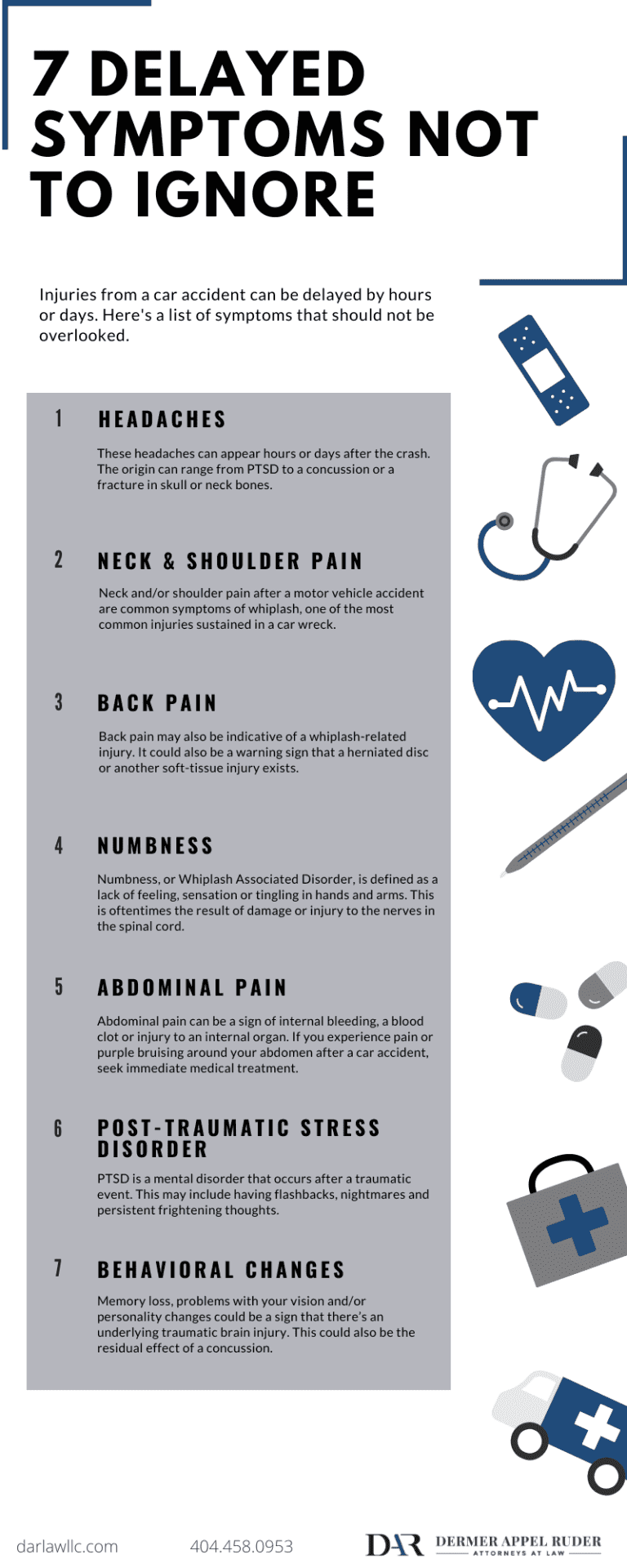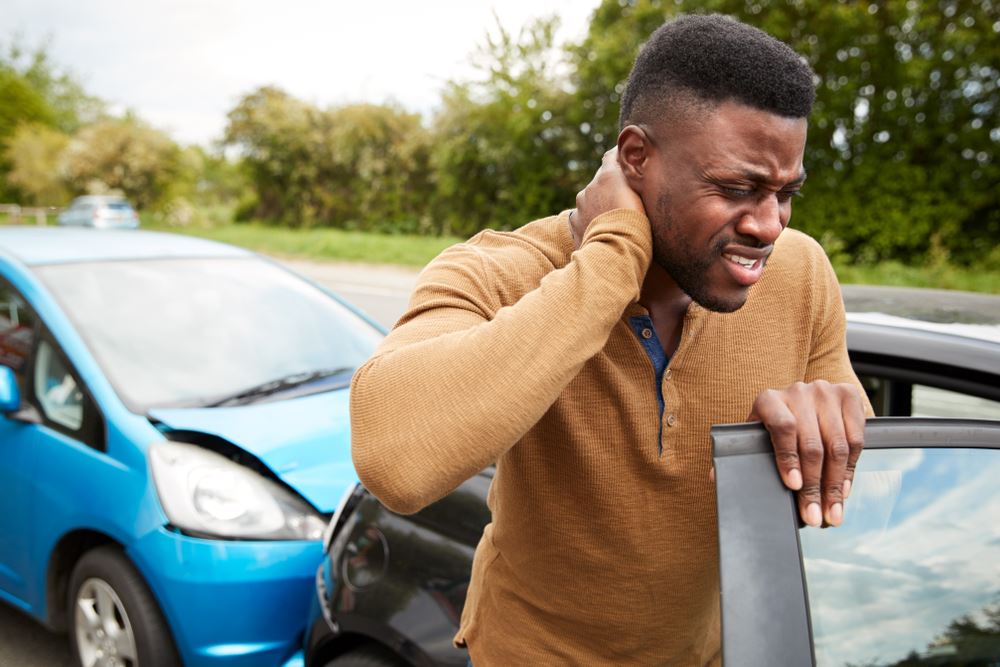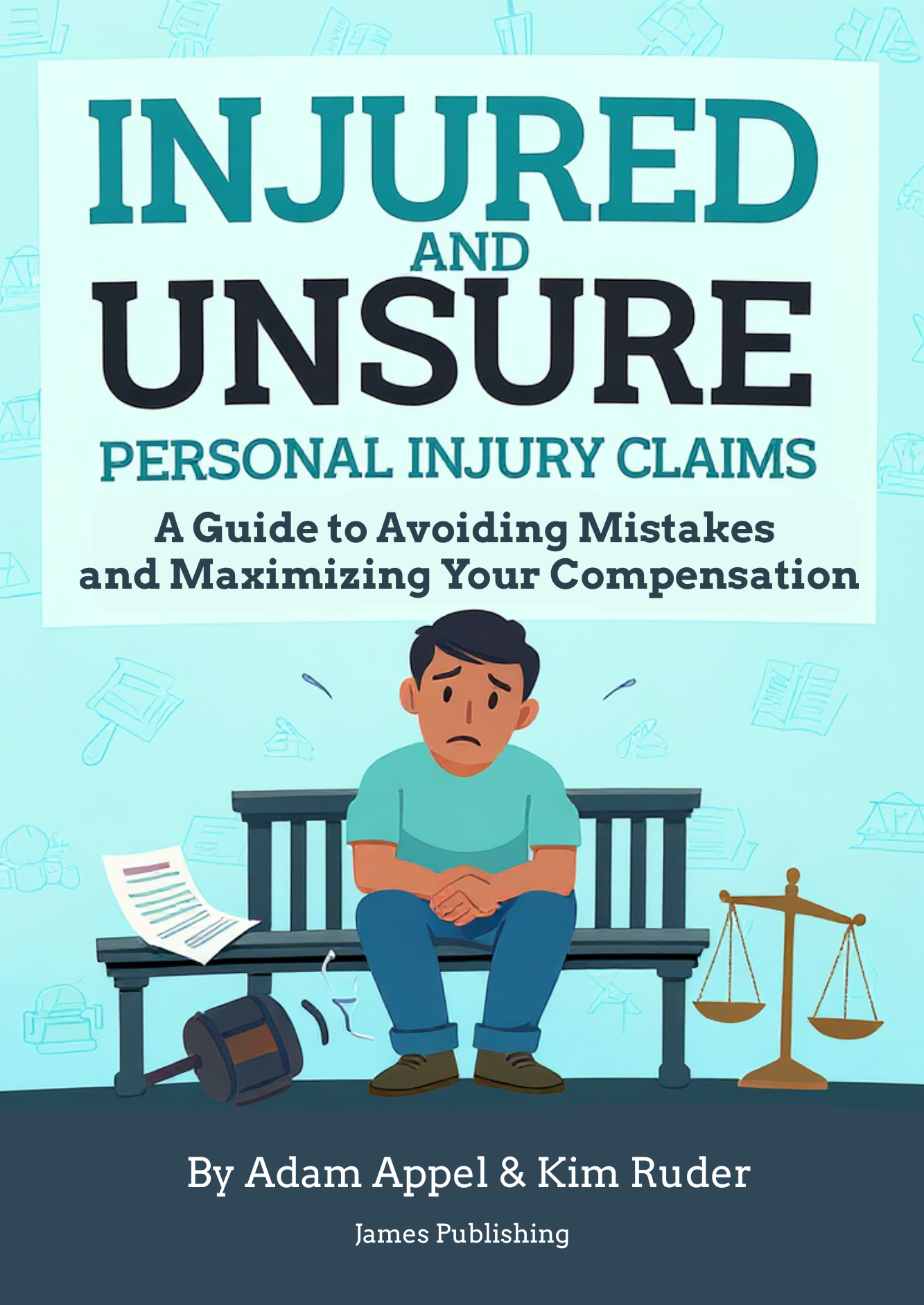Table of Contents

You’re on the way to your daughter’s softball game from work. Maybe it’s your son’s piano recital. As you get a little closer to the venue, you see that traffic is gridlocked. Impatiently, you ask your GPS to find an alternate route when it happens – an SUV slams into the back of your car. It’s a far too common occurrence across the state of Georgia.
“Motor vehicle crashes (MVCs) are the leading cause of injury deaths and second leading cause of hospitalizations and ER visits in Georgia.” – Georgia Department of Public Health
Your car is a bit banged up and your anxiety is through the roof, but physically, you’re in one piece. You call 9-1-1, take detailed pictures of the scene, exchange contact information with the other driver, and then try to get your bearings. When first responders arrive, you get a quick medical evaluation and move on to support your family. After the game, you notice you’ve got a slight headache. Rightfully, you attribute it to your eventful day, take ibuprofen, and power through dinner. By the time you make it home, the headache is accompanied by neck pain and stiffness.
What you’re experiencing is likely more than anxiety. While your car seemed to be the only thing damaged in the car crash, you could be injured and not know it. It is not uncommon for pain resulting from traumatic accidents to show up hours, days, or even weeks after the initial incident. You are experiencing symptoms of one or more common injuries after a motor vehicle crash.
7 Symptoms to be Aware of After a Car Crash
Here’s a list of the seven symptoms you should not overlook after a car accident:
1. Headaches – There are several causes for headaches after a car accident. These headaches can appear hours or days after the crash. The origin can range from PTSD to a concussion or a fracture in the skull or neck bones.
2. Neck and shoulder pain – Neck and/or shoulder pain after a motor vehicle accident are common symptoms of whiplash, one of the most common injuries sustained in a car wreck.
Whiplash occurs when your neck bends forcibly forward, then backward.
Albeit a quick action, this motion can injure the spine, disks between the bones, ligaments, muscles, nerves, and other tissues of the neck.
3. Back pain – Back pain may also be indicative of a whiplash-related injury. It could also be a warning sign that a herniated disc or another soft-tissue injury exists.
4. Numbness – Numbness, or Whiplash Associated Disorder, is defined as a lack of feeling, sensation, or tingling in hands and arms. This is oftentimes the result of damage or injury to the nerves in the spinal cord.
Approximately 3 million Americans sustain whiplash injuries each year.
5. Abdominal pain – Abdominal pain can be a sign of internal bleeding, a blood clot, or injury to an internal organ. If you experience pain or purple bruising around your abdomen after a car accident, seek immediate medical treatment.
6. Post-Traumatic Stress Disorder (PTSD) – PTSD is a mental disorder that occurs after a traumatic event. This may include having flashbacks, nightmares, and persistent frightening thoughts.
7. Behavioral changes – Memory loss, problems with your vision, and/or personality changes could be a sign that there’s an underlying traumatic brain injury. This could also be the residual effect of a concussion.
Now that the Pain is here, What Should I Do?
The headache and stiffness that you woke up with the day after the motor vehicle crash are your body’s signs to proceed with caution. Since car accident injuries can be delayed by hours, days, or even weeks, we recommend seeking medical attention soon after the crash, even if you aren’t hurting. Delaying diagnosis or treatment could slow your recovery time.
How Long Will I Be in Pain?
A general rule of thumb is: that the more serious your injuries, the longer the pain and soreness could last. The headaches are usually harmless and will go away on their own. However, if they continue, we recommend finding an auto-injury doctor who specializes in helping to alleviate headaches. If accompanied by additional symptoms, such as loss of range of motion or blurred vision, recovery time could be delayed by physical therapy or follow-up treatments. The neck and shoulder pain will need an X-ray, MRI, or CT scan to accurately diagnose the injury and determine the subsequent treatment plan. The same is true for back pain and numbness, however, six weeks is the average recovery time for car accident injuries. Abdominal injuries, PTSD, and behavioral issues may stick around longer.
Can I file a personal injury claim if my injuries are delayed?
Once you’ve sought medical treatment for your delayed accident injury and received a confirmed diagnosis, you may consider legal action against the at-fault driver. Remember: time is your friend when it comes to filing and settling a personal injury claim. Do not sign a Release of Liability form until after you’ve had a complete medical evaluation. This document effectively ends the potential lawsuit as well as any other claims related to your incident.
To move forward with an injury claim, you will also need:
- An estimate of any future medical costs you may incur as a result of those injuries.
- An experienced personal injury attorney.
If you’ve been in a car accident, symptoms of your injuries may not show up until days later. Though the situation may be unfamiliar, the team at Dermer Appel Ruder, LLC has more than 80 years of experience with insurance companies and personal injury claims. Get your free case evaluation today by calling us at (404) 390-4224.
Related Links:
- How Big Truck Crash Cases Differ from Car Wrecks
- How to Handle Changing Rules and Regulations Around Police and Car Accidents
- How Long After a Car Accident Can You Sue in Georgia?
- How Much Can Someone Sue for a Car Accident in Georgia?
- Can My Georgia Car Accident Settlement Exceed the At-Fault Driver’s Insurance Coverage?
- Winter Car Accidents – Are You at Fault?
- How Many Georgia Car Accidents Are Caused by Drunk Drivers?
- Do I need an Attorney for a Car Accident That’s Not My Fault?
- What’s An Average Georgia Car Accident Injury Case Worth?



